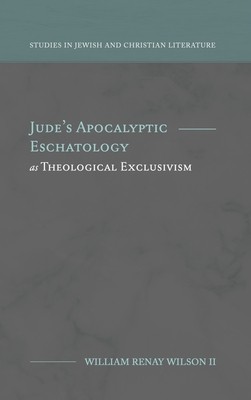
- We will send in 10–14 business days.
- Author: William R Wilson
- Publisher: Fontes Press
- ISBN-10: 1948048493
- ISBN-13: 9781948048491
- Format: 15.2 x 22.9 x 1.1 cm, kieti viršeliai
- Language: English
- SAVE -10% with code: EXTRA
Jude's Apocalyptic Eschatology as Theological Exclusivism (e-book) (used book) | bookbook.eu
Reviews
Description
In early Judaism and Christianity, the apocalypse genre and related apocalyptic materials shared a common ideology that can be identified as apocalyptic eschatology. Religious communities employed apocalyptic eschatology in order to resist theological pluralism as it encroached upon them. Writers were capable of utilizing apocalyptic eschatology to dictate acceptable belief and practice in an effort to control and preserve a faithful community. Among the early Christian writings, Jude's use of this ideology follows the same exclusionary pattern, addressing theological pluralism that his ancient audience faced and that the contemporary church continues to face today. Through his polemic, Jude also reveals a cluster of worldview non-negotiables for the early church.
EXTRA 10 % discount with code: EXTRA
The promotion ends in 23d.02:03:35
The discount code is valid when purchasing from 10 €. Discounts do not stack.
- Author: William R Wilson
- Publisher: Fontes Press
- ISBN-10: 1948048493
- ISBN-13: 9781948048491
- Format: 15.2 x 22.9 x 1.1 cm, kieti viršeliai
- Language: English English
In early Judaism and Christianity, the apocalypse genre and related apocalyptic materials shared a common ideology that can be identified as apocalyptic eschatology. Religious communities employed apocalyptic eschatology in order to resist theological pluralism as it encroached upon them. Writers were capable of utilizing apocalyptic eschatology to dictate acceptable belief and practice in an effort to control and preserve a faithful community. Among the early Christian writings, Jude's use of this ideology follows the same exclusionary pattern, addressing theological pluralism that his ancient audience faced and that the contemporary church continues to face today. Through his polemic, Jude also reveals a cluster of worldview non-negotiables for the early church.


Reviews